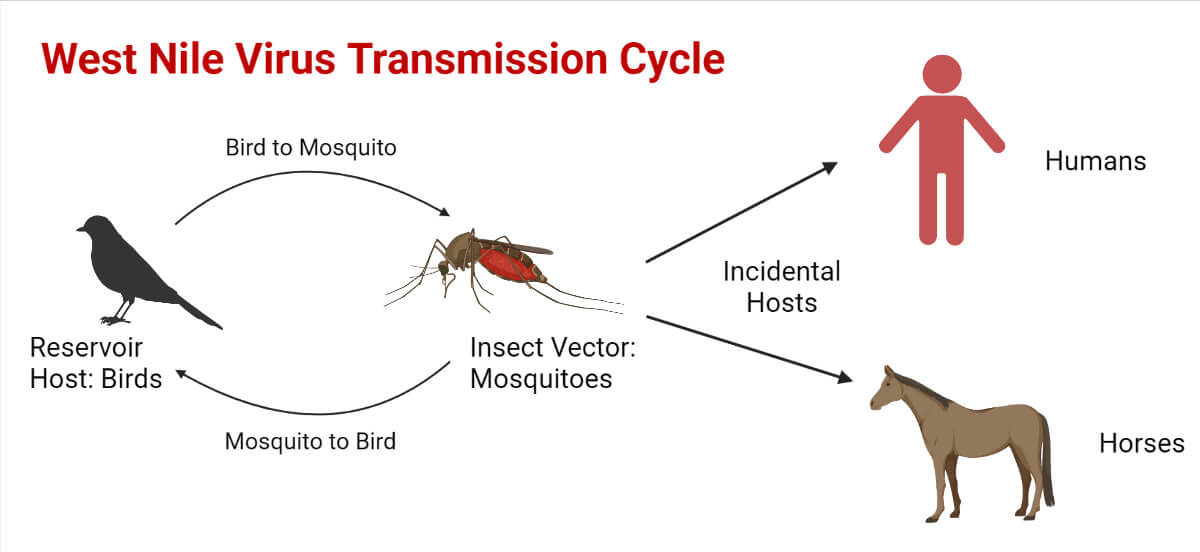West Nile Virus Alert, New York City and New Jersey Face Mosquito Threat
West Nile virus is the leading cause of mosquito-borne diseases in the United States, with cases typically peaking during the summer and fall. The Centers for Disease Control and Prevention (CDC) warns that most infected individuals show no symptoms, but in severe cases, the virus can cause fever, headache, altered mental status, and other neurological dysfunctions.

New Jersey’s First West Nile Virus Case
The detection of West Nile virus in mosquitoes has put both New York City and New Jersey on high alert. New Jersey has recently reported its first case of the virus, causing concern among residents and health officials.
Meanwhile, New York City is grappling with a significant number of mosquito pools testing positive for West Nile virus, particularly in Staten Island. The proximity between the two areas raises concerns about the potential spread of the virus. As summer progresses, authorities are closely monitoring the mosquito activity and urging residents to take necessary precautions.
Winslow Township, New Jersey, is on alert as the state reports its first case of West Nile virus this year. The case, detected in a resident on July 17, has raised serious concerns among local health officials. West Nile virus is transmitted through mosquito bites and can lead to severe health complications. As the situation unfolds, health authorities are closely monitoring the spread of the virus in the region.

New York City’s Mosquito Menace
In New York City, the Health Department has made a distressing discovery, finding West Nile virus in a staggering 181 mosquito pools across the city. The majority of these cases were detected on Staten Island, prompting extra vigilance among residents in the area.
Experts warn that the proximity between New Jersey and New York City could facilitate the spread of the virus, making it essential to closely monitor mosquito activity in both regions. Meanwhile, Arizona, Arkansas, Illinois, Iowa, Massachusetts, and Colorado have also detected mosquitoes that carry West Nile virus.
West Nile Virus Overview
West Nile virus is the leading cause of mosquito-borne diseases in the United States, with peak transmission occurring during the summer and fall. The Centers for Disease Control and Prevention (CDC) states that most infected individuals show no symptoms, but in severe cases, the virus can lead to fever, headache, altered mental status, and other neurological dysfunctions.

Past Statistics
The previous year’s data highlights the potential dangers posed by West Nile virus. New Jersey reported 20 human cases, resulting in four fatalities, while New York City recorded 36 cases with two fatalities and 10 cases of West Nile fever.
Understanding West Nile Virus, Risks, Symptoms, and Treatment
West Nile virus (WNV) poses a significant threat as the primary cause of mosquito-borne disease in the United States. The virus is transmitted through the bites of infected mosquitoes, with cases typically occurring during the mosquito season, which spans from summer to fall.
Currently, there are no vaccines or specific medications available to prevent or treat WNV in people. While most infected individuals do not experience symptoms, some may develop fever and other mild effects, while a small percentage can suffer from severe and potentially life-threatening illnesses. To minimize the risk of WNV, preventive measures such as using insect repellent and wearing protective clothing are crucial.
Symptoms of West Nile Virus:
Asymptomatic: The majority of individuals (8 out of 10) infected with West Nile virus show no symptoms at all.
Febrile Illness: About 1 in 5 infected people experience febrile illness, characterized by fever along with symptoms like headache, body aches, joint pains, vomiting, diarrhoea, or rash. While most recover completely, fatigue and weakness may persist for several weeks or months.
Severe Illness: Approximately 1 in 150 infected individuals develop severe illness affecting the central nervous system, such as encephalitis or meningitis. Symptoms of severe illness include high fever, headache, neck stiffness, disorientation, coma, tremors, convulsions, muscle weakness, vision loss, numbness, and paralysis. Severe illness can affect people of all ages, but those over 60 years old and individuals with certain medical conditions are at greater risk.
Recovery and Fatality: Recovery from severe WNV illness can be a slow process, taking several weeks or months. In some cases, there might be permanent effects on the central nervous system. Tragically, about 1 out of 10 people with severe illnesses affecting the central nervous system do not survive.
Diagnosis: If West Nile virus infection is suspected, individuals should consult their healthcare provider for evaluation. Diagnosis is typically based on signs and symptoms, along with a history of potential exposure to mosquitoes carrying the virus. Laboratory testing of blood or spinal fluid can also confirm the infection or rule out other similar diseases.
Treatment: As of now, no specific vaccines or medicines exist to treat West Nile virus infection. Antibiotics, which are used for bacterial infections, are ineffective against viruses. Mild cases can be managed with rest, fluids, and over-the-counter pain medications. However, severe cases often require hospitalization for supportive treatment, including intravenous fluids, pain relief, and nursing care.
The Last Bit, As summer progresses, the threat of West Nile virus remains a concern for both New York City and New Jersey residents. Health authorities emphasize the importance of staying informed and taking necessary precautions to protect themselves and their communities from this buzzing menace. Vigilance, awareness, and mosquito control measures are key to combatting the spread of the virus and ensuring a safer environment for everyone.






